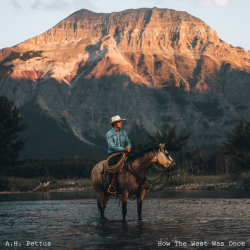A basement recording tracks an artist’s emotional journey.
 ‘How the West Once Was’ is a recent release by A.H. Pettus. His previous offering, The ‘Black and White Album‘, was written under his pseudonym, which was also that of his band, Remy St. Claire. While the title and cover of the new album conjure up the old West of cattle drives, gunfighters and injun wars, the lyrics describe the West portrayed by cowboy movies. In the album’s title song, “What the West Once’ Was’, Pettus sings: “I’m just a backlot cowboy/Turnin stunts for free/Maybe someday I’ll take enough licks/Get my name on that marquee, oh boy.” The narrative of ‘The Story of Buddy Lee’ reads like the treatment for a movie pitch. It’s also one of the songs where Pettus plays electric rather than acoustic guitar, creating a sound that conjures up Ennio Morricone’s soundtrack for “The Good, The Bad and The Ugly.” The Hollywood influence isn’t surprising as Pettit has been an actor since he was six. His credits include starring in ‘The Lost Stallions: The Journey Home’ while using the name Alexander Hugh.
‘How the West Once Was’ is a recent release by A.H. Pettus. His previous offering, The ‘Black and White Album‘, was written under his pseudonym, which was also that of his band, Remy St. Claire. While the title and cover of the new album conjure up the old West of cattle drives, gunfighters and injun wars, the lyrics describe the West portrayed by cowboy movies. In the album’s title song, “What the West Once’ Was’, Pettus sings: “I’m just a backlot cowboy/Turnin stunts for free/Maybe someday I’ll take enough licks/Get my name on that marquee, oh boy.” The narrative of ‘The Story of Buddy Lee’ reads like the treatment for a movie pitch. It’s also one of the songs where Pettus plays electric rather than acoustic guitar, creating a sound that conjures up Ennio Morricone’s soundtrack for “The Good, The Bad and The Ugly.” The Hollywood influence isn’t surprising as Pettit has been an actor since he was six. His credits include starring in ‘The Lost Stallions: The Journey Home’ while using the name Alexander Hugh.
It’s not only his experience with cinema that seems to have influenced Pettus’ writing. The opening to ‘Thanks’ is reminiscent of Tom Petty, another Southerner who moved to Los Angeles. Pettus’ ‘The Ten Million’ reprises Bob Dylan’s ‘With God on Our Side’. You don’t have think twice to hear Dylan’s influence on ‘How to Chase A Bird In Flight’. And it doesn’t take an act of faith to believe John Hiatt may have had some influence on Pettus’ ‘Have A Little Faith In Me’.
But the most important influence on Pettus seems to have been the events in his own life. He wrote the songs before, during and after the divorce from his first wife, starting to compose when he was living in Los Angeles and completing the writing and recording after moving back to his hometown of Charlotte, North Carolina.
This is a spare album. Recording, instrumentation, mixing and mastering were all done by Pettus in his home studio outside Charlotte. This experience has produced a deeply personal album. As Pettus has noted, “Some people have therapists, and some people have a bottle of bourbon and a guitar.”
Sometimes a therapist may be the better option. The risk of working out deeply personal experiences artistically is that while the process may be cathartic, the product may be indecipherable.
Pettus’ lyrics are at times bitter as in ‘Thelma Lou’: “And it’s been eight long years under you/And I’m tired of all of the fears you put me through/So please leave me here Thelma Lou”. At times, he is opaque, some times in the same song. ‘Thelma Lou’ again: “And they sit on thrones made of paper/And when it rains/It falls to pieces/And slides down the drain.” A number of songs tell of the pain of a relationship gone sour as in ‘We Were So Free’: “No brownie points for the attempt/I said I’d die for you one time but never again/Never again/Never again/Never again”. Others string together words that that seem to be there just because they rhyme. In ‘Have A Little Faith In Me’, for instance: “They take/And we need a break/But heaven goes to those that you make”.
Musically, the album is pretty basic and Pettus’ voice doesn’t have a lot of depth so there is lot riding on the lyrics and they don’t always carry the load. Making an album as you sit alone presents a lot of challenges. For example, in the midst of the excitement of having an idea there is no one to ask if it is a good idea. Sam Beam (Iron and Wine) and Justin Vernon (Bon Iver) pulled it off, but they are probably exceptions. There must be thousands of songs sung in basements that would have been more therapeutic had the stories been told on a couch rather than shared with the public. ‘How the West Once Was’ probably falls somewhere in the middle.


